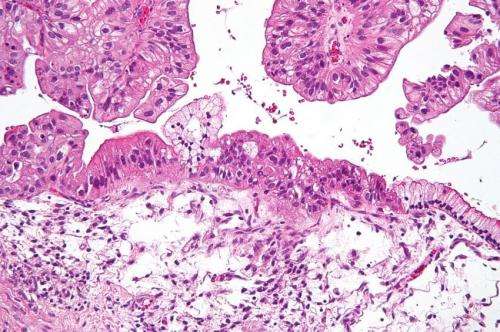This article has been reviewed according to Science X's editorial process and policies. Editors have highlighted the following attributes while ensuring the content's credibility:
fact-checked
proofread
Novel FolRα-targeting antibody drug conjugate shows promise in recurrent epithelial ovarian cancer

Updated dose expansion data of the phase I STRO-002-GM1 study have been presented today by Ana Oaknin, Principal Investigator of the Vall d'Hebron Institute of Oncology's (VHIO) Gynecological Malignancies Group, on the ground at the 2023 Annual Meeting of the American Society of Clinical Oncology (ASCO), 2-6 June in Chicago, U.S..
This global study was designed to evaluate the efficacy and safety of the novel FolRα-targeting antibody drug conjugate (ADC) luveltamab tazevibulin (STRO-002—luvelta) in patients with recurrent epithelial ovarian cancer with identified expression levels of folate receptor alpha (FolRα) higher than 25%. This ADC induces cytotoxic and immunologic cell death, and using site-specific conjugation technology and is designed to target a broad range of FolRα-expressing ovarian tumors.
"Folate receptor alpha is a folate-binding protein overexpressed on ovarian and several other epithelial malignancies. Its overexpression in solid tumors promotes cancer cell proliferation and persists in metastatic or recurrent disease after therapy. This driver of cancer cell proliferation therefore represents a highly relevant target for the development of novel treatment strategies in ovarian and endometrial cancers," said Ana Oaknin, Medical Oncologist at the Vall d'Hebron University Hospital (HUVH), and first author of this present study.
STRO-002-GM1 enrolled 44 patients with advanced ovarian cancer and disease recurrence as a result of platinum chemotherapy resistance after 1-3 prior lines of treatment or platinum sensitive disease after 2-3 previous lines of platinum chemotherapy. FolRα expression was not required for study entry but was analyzed retrospectively in archival tissue to evaluate if the overexpression of this protein could potentially guide patient selection.
Patients were randomized 1:1 to receive luveltamab at 4.3 mg/kg or 5.2 mg/kg (23 patients and 21 patients, respectively). 33 of the 44 patients enrolled in this study presented with FolRα expression levels higher than 25%. The dose expansion data show significant clinical benefit in those patients selected for presenting FolRα expression >25%, with an overall response rate of 37.5%. The investigators observed a 44% response rate in those patients who received treatment with the higher 5.2 mg/kg dose.
The most common adverse events included neutropenia, arthralgia and anemia that were managed with standard medical treatment and dose reductions. Neutropenia had a higher incidence at 5.2 mg/kg than 4.3 mg/kg. While treatment adverse events led to dose reduction in 76% of patients treated with the 5.2 mg/kg dose, treatment was only suspended in one patient.
"These dose expansion data confirm the encouraging activity of luveltamab tazevibulin at starting doses ranging from 4.3 to 5.2 mg/kg in patients with recurrent, platinum resistant ovarian cancer with FolRα expression levels of more than 25%, and support further clinical evaluation. Led by VHIO investigators in Europe, a global phase II/III study is already planned to evaluate this novel ADC in this patient population," concluded Ana Oaknin.
More information: Conference: conferences.asco.org/am/attend




















